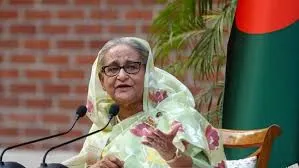The interim government of Bangladesh has formally demanded the extradition of the country’s former Prime Minister Sheikh Hasina from India. On this, former High Commissioner to India in Bangladesh Mahesh Sachdeva said that Sheikh Hasina can stop it by challenging the extradition process in the court.
Grounds and possible obstacles to extradition
1. India-Bangladesh Extradition Treaty:
- An extradition treaty was signed between India and Bangladesh in 2013, which was amended in 2016.
- Its objective was to deal with terrorism and extremism between the two countries.
2. Refusal to extradite in political cases:
- Under the treaty, extradition can be refused in cases of a political nature.
- According to Mahesh Sachdeva, Sheikh Hasina may approach the court and argue that she is likely to be treated unfairly in Bangladesh.
3. India’s stance:
- India may claim that Sheikh Hasina is not guaranteed fair treatment under the justice system in Bangladesh.
- Citing cases of European countries rejecting India’s extradition requests, Sachdeva said India can also stop extradition on similar lines.
example of european cases
- India had sought extradition of the terrorists from Europe, which was rejected on the grounds that the Indian judicial system and prisons were not up to European standards.
- Fugitive industrialist Vijay Mallya had also used similar arguments against his extradition.
Bangladesh’s new demand
1. Note sent to India:
- The interim government of Bangladesh has requested India to deport Sheikh Hasina, saying she should return to the country to face justice.
- However, the note does not clarify what the allegations are against Sheikh Hasina.
2. Impact on Bilateral Relations:
- Sachdeva said that Sheikh Hasina’s stay in India could affect the relations between India and Bangladesh.
- It may also promote anti-India sentiment in Bangladesh.
Possible dispute over extradition
Despite strong diplomatic relations between India and Bangladesh, the extradition process faces several challenges:
- Cases of political nature: Under the treaty, India has the right to refuse extradition on this ground.
- India’s neutral stance: India must ensure that any decision does not negatively impact domestic politics in Bangladesh or India-Bangladesh relations.
